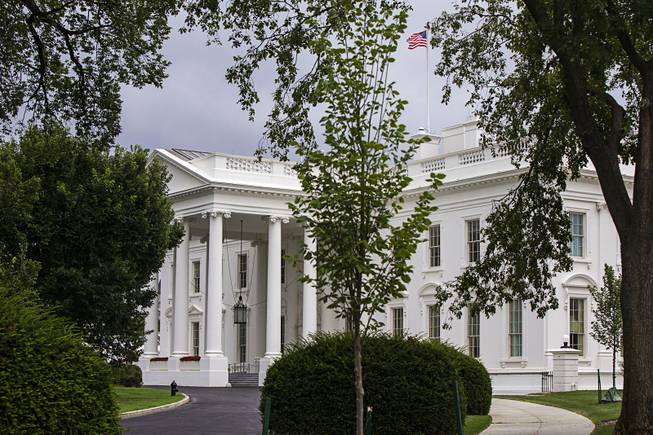
Al Drago / The New York Times
The White House in Washington, ahead of a storm on Aug. 9, 2016. The jockeying for jobs in a future Trump or Clinton administration is already well underway in the capital, thanks in part to a new law aiming to make the handoff between White House and the incoming administration more formal and less frenetic than it has been in the past.
Saturday, Aug. 27, 2016 | 2 a.m.
WASHINGTON — Hillary Clinton and Donald Trump have yet to face off in their first debate, but both candidates have already moved teams into a plush marble-and-glass office building a block from the White House, where they are vetting résumés, sketching out organizational charts and otherwise planning the transition to a Trump or Clinton administration.
The jockeying for jobs that usually consumes the two and a half months between Election Day and Inauguration Day is well underway in Washington, with people swapping their notional lists of cabinet officers and speculating about who might get the plum deputy posts just under them.
Speculation on the Republican side has been somewhat subdued, in part because Trump’s personnel preferences are something of a mystery. But on the Democratic side, Clinton’s persistent lead in the polls has made it hard for her supporters to resist the urge to measure the drapes. And no area is more rife with jockeying than national security, with Clinton, a former secretary of state, in the rare position of having worked with dozens of the people she may employ again.
“There has been a lot of talking going on, and now that it looks like she’s going to win, there is even more,” said Vali R. Nasr, a former adviser to Clinton at the State Department who is now the dean of the Johns Hopkins School of Advanced International Studies.
The Clinton campaign’s choice of Thomas E. Donilon, a former national security adviser to President Barack Obama, to oversee this part of the transition reflects continuity with the Obama administration and underscores the differences between 2016 and 2008. When Obama became president-elect, he faced a Democratic foreign policy establishment that was split between those who supported him and those who backed Clinton, but was eager to be back in power after eight years of Republican rule.
This time, Clinton would get to choose from a largely unified Democratic Party, with a strong bench of policymakers in diplomacy, defense and intelligence who have served in the Obama administration. And she would have the option of drawing from Republicans who have publicly disavowed Trump, including Michael Hayden, a former director of the CIA and the National Security Agency, and Robert B. Zoellick, a former U.S. Trade Representative.
“Because there has been such a massive defection of the Republican foreign policy bench,” Nasr said, “in a way, she has come to inherit three-quarters of the foreign policy establishment.”
There are other reasons for this early start in the transition, chiefly a new law that aims to make the handoff between the White House and the incoming administration more formal and less frenetic than in the past. On Thursday, both campaigns met with the White House chief of staff, Denis McDonough, and other senior officials to discuss how the Obama administration planned to handle the transition.
Gov. Chris Christie of New Jersey, the head of Trump’s transition team, represented the Trump campaign, while Ken Salazar, a former interior secretary under Obama, represented the Clinton campaign. Salazar is the chairman of what the campaign calls the Clinton-Kaine Transition Project.
Neither campaign is eager to discuss the process in detail for fear of looking presumptuous. Brian Fallon, a spokesman for the Clinton campaign, said fewer than 10 people were working in the offices at 1717 Pennsylvania Avenue, a number that would not grow beyond two dozen until after Nov. 8 — and then only if Clinton won.
(BEGIN OPTIONAL TRIM.)
None of the job seekers are eager to talk either, at least on the record, but they are trying to show their usefulness in other ways. Clinton’s campaign has already designated 35 people to serve as coordinators or senior partners for its foreign

Join the Discussion:
Check this out for a full explanation of our conversion to the LiveFyre commenting system and instructions on how to sign up for an account.
Full comments policy